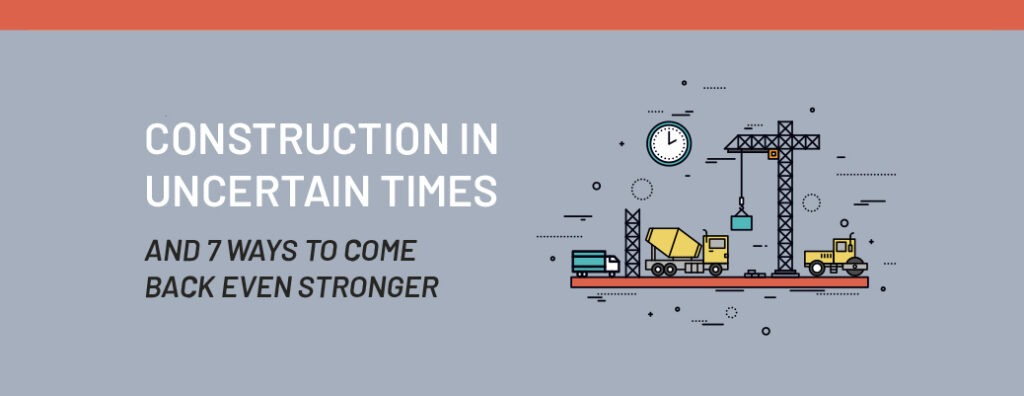
Let’s be honest. Right now, none of us have all the answers. Uncertainty surrounding the duration and severity of the COVID-19 crisis makes it hard to anticipate its true impact or when we will fully resume normal project operations. While in many areas, construction is currently considered essential, all projects are subject to unpredictable impacts. Interim measures may be required for some time even after the initial crisis is mitigated. Some things we can do as an industry are prepare, focus on health and safety, and solve each challenge as it comes.
As we look to the other side of this pandemic, the impacts on our projects are complex. A flood of delays and cost overruns on both public and private projects are inevitable for a variety of reasons – material shortages, disruptions to supply chains, sickness, quarantine, labor shortages, and ordered work stoppages. There is no simple answer to the challenges we will face, or a light switch we will flip to “on” when it’s time to resume work as usual. There are and will be many nuances arising from the pandemic, and in order to resume work, sustain productive working relationships, and avoid potential claims or litigation, there are some proactive steps we can take now to prepare ourselves.
7 Ways to Prepare for Resuming Work in the Construction Industry
1. Be Flexible and Rational
It is obvious that there is no one-size-fits-all solution to the magnitude of this situation and clearly rigid adherence to our usual norms—whether contract provisions, project management plans, or procedure manuals—simply won’t work. No procedures exist for a situation such as this so we must therefore rely on our flexibility, creativity, and solutions-oriented mindset. We all need to rationally address each situation and think through it: are there alternative materials that can be used? Can we meet remotely? What additional safety measures can be employed to keep work going?
Those of us in the construction industry got into this field because we are problem solvers, so recognize that the “normal” solution may not work, but there may be equally good alternatives if we look for them. COVID-19 is being described as a “black swan” event. These events are defined as historical events that are both rare and unpredictable, that no one thought would happen.
In a 2015 Construction Industry Institute symposium on “Recovering from a Major Crisis – Black Swan Event,” crisis managers noted that not every plan implemented during a crisis will be fully successful or fixed in time, since we may have “poor information, unexpected consequences, and more intense impacts.” Through these “black swan,” or difficult-to-predict events, we should not be discouraged but instead trust in the capabilities and innovativeness of the team to cope with any circumstance.

2. Foster a Collaborative Approach
Collaboration and good communication will be key to managing the impacts and steering projects through this period of uncertainty. To this end, projects teams should spend time now practicing the tenets of partnering. Coming together to mutually define what project success will look like considering these circumstances will help when work is set to resume as normal. Think beyond our usual roles or shorthand labels as “project manager,” “subcontractor,” or “designer,” and see each other as fellow human beings all dealing with unprecedented uncertainty.
Multiple perspectives and sources of expertise will undoubtedly deliver the best solutions and strong relationships will be critical to making good decisions. As the CII Black Swan symposium noted, project teams should:
- Test assumptions to vet “unintentional blindness” or inherent biases
- Seek out all resources that will broaden the view of available options
- And be “relentlessly persistent” and confident that solutions can be found
Communicating regularly and often through clearly established channels will go a long way to enhancing the team’s ability to collaborate and act.
3. Be Specific
Treat each situation with some level of granularity. The key is to review and be able to respond to different types of impacts. Compartmentalize them. A delay in delivery of roofing materials may require a different response than a state-wide, stay-at-home order that prevents a subcontractor from working on site. Identifying and separating different types of impacts carefully now will help pinpoint the specific delay or cost impacts and will simplify resolution later. For each specific impact, seek out the expertise of the right team of experts to arrive at the right solution.
4. Document, Document, Document
Be prepared now for what you will need to demonstrate later. Record impacts right as they occur, instead of trying to recall them later. Continuously assess construction progress to date and include plenty of photographic documentation if possible. Document any changes in staffing composition and size, material and equipment availability and delivery, access, production rates, sequencing and phasing, funding and cash flow, government directives, and any other indicators.

5. Focus on the Positive
The challenges we face now are not unlike the response would be to an accident or catastrophic event occurring on site – while there is an abrupt halt that can cause confusion, defensiveness, and even draconian new policies, these situations can trigger a change for the good – providing lessons learned to operate more safely and collaboratively. The COVID-19 pandemic gives each organization the ability to show leadership and strength, focusing on big goals while addressing the new reality. The CII Black Swan Symposium encourages us to look at an event “as an opportunity to show the very best of what the organization can do rather than as a period to batten down the hatches.” Mindset is everything.
6. Care for the Team
Yes, mindset is everything and to that end, we must recognize that this event has and will continue to create personal impact, and for some, the impact is severe and deeply felt. We should monitor how our teammates are doing and provide much-needed breaks. We cannot be expected to make critical decisions based on objective data if we are depleted.
7. Think About What This Historical Period Will Teach Us
The COVID-19 pandemic is indeed a “black swan” event. Going forward, though, everyone will recognize that the spread of infectious disease is a measure we need to plan for, just as prior events (such as commodity shortages, highly publicized safety failures, and other events) have informed our behaviors going forward. We will all learn many lessons from this period and will have much to apply to future projects in our risk assessments and work planning.
Through these unprecedented times, there is much that remains uncertain. Current and future impacts of COVID-19 are being felt across the construction industry, but the work we can do now is just as, if not more, important to prepare for work to resume as normal. Looking ahead and considering how projects will be affected, documenting impacts, carefully examining contracts, and collaborating frequently with the project team will help to ensure our industry comes back even stronger.
If you would like to improve your project’s efficiency, learn more about our facility performance consulting services to see how we can help you!




